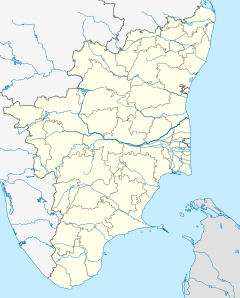Brihadisvara Temple
| Brihadeeswarar Temple | |
|---|---|
 |
|
| Name | |
| Other names | Peruvudaiyar Kovil Brihadeshwaran Temple Big Temple |
| Geography | |
| Coordinates | 10°46′58″N 79°07′54″E / 10.78278°N 79.13167°ECoordinates: 10°46′58″N 79°07′54″E / 10.78278°N 79.13167°E |
| Country | India |
| State | Tamil Nadu |
| District | Thanjore |
| Location | Thanjavur |
| Culture | |
| Primary deity | Shiva |
| Important festivals | Maha Shivaratiri |
| Architecture | |
| Architectural styles | Tamil architecture |
| History and governance | |
| Date built | 10th century AD |
| Creator | Raja Raja Chola I |
'Brihadeeswarar Temple (locally known as "Big temple") is a Hindu temple dedicated to Shiva located in Thanjavur in the Indian state of Tamil Nadu. It is also known as RajaRajeswara Temple Rajarajeswaram and Peruvudayar Temple. It is one of the largest temples in India and is an example of Dravidian architecture during the Chola period. Built by Raja Raja Chola I and completed in 1010 CE, the temple turned 1000 years old . The temple is part of the UNESCO World Heritage Site known as the "Great Living Chola Temples", with the other two being the Brihadeeswarar Temple, Gangaikonda Cholapuram and Airavatesvara temple.
The temple stands amidst fortified walls that were probably added in the 16th century. The vimanam (temple tower) is 198 ft (60 m) high and is one of the tallest in the world. The Kumbam (the apex or the bulbous structure on the top) weighs around 80 tons. There is a big statue of Nandi (sacred bull), carved out of a single rock measuring about 16 ft (4.9 m) long and 13 ft (4.0 m) high at the entrance. The entire temple structure is made out of granite, the nearest sources of which are about 60 km to the west of temple. The temple is one of the most visited tourist attractions in Tamil Nadu.
The temple was builted to grace the throne of the Chola empire by the Tamil emperor Arulmozhivarman, popularly called Rajaraja Chola I, in compliance to a command given to him in a dream. One of the first great Tamil Chola building projects, the temple's foundations were laid out in 1002 CE. An axial and symmetrical geometry rules the temple layout. Temples from this period and the following two centuries are an expression of the Tamilars (Chola) wealth, power and artistic expertise. The emergence of such features as the multifaceted columns with projecting square capitals signal the arrival of the new Chola style.
...
Wikipedia

